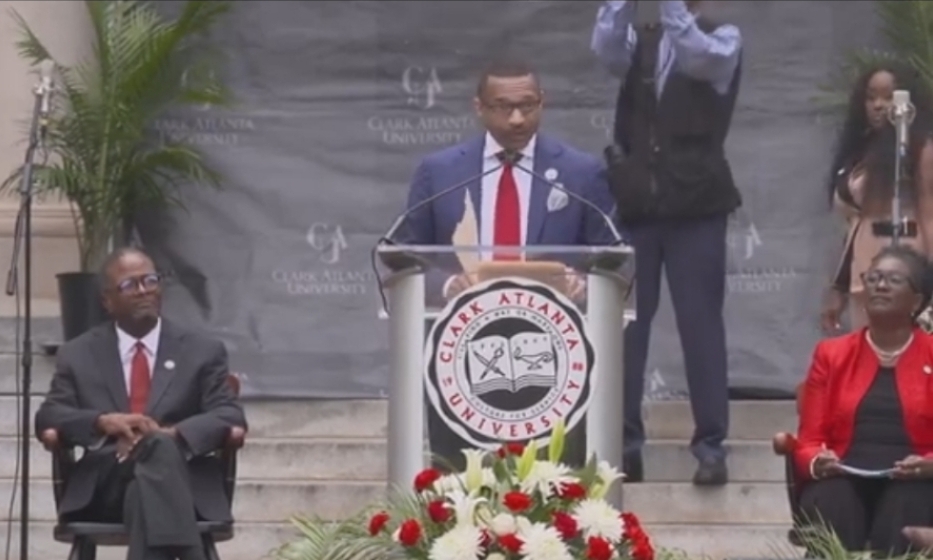I must admit, I’m not a huge fan of politics or progressive ideology, but it’s hard to avoid the persistent presence of Dr. Rashad Richey’s commentary and shows on traditional and nontraditional media. I lean more on the conservative side and consider myself independent. I’ve also taken time on occasion to express my adverse opinion to Richey’s publicly held notions about policies, social narratives, and the economy. He makes good points, but I just think my points are better. But that’s not the reason for this blog.
A friend of mine recently shared the Clark Atlanta University YouTube link to a speech Richey gave for their “Convocation Day”, which admittedly is a foreign concept to me. Nevertheless, the email was titled, “Check out your guy, he’s now into physics”. I eagerly clicked the link, searching for the laugh my friend wanted me to experience. I assumed it was going to be a lecture of sorts but was surprised by the outdoor ambiance. It was celebrative, with a great chorus, something I never experienced in a collegiate on-campus setting. But still, I had a mission, to find Richey’s commentary (or speech), about physics. At this point in my search, I was unaware of which to expect, since my friend only shared the link and a brief blurb.
Before continuing, allow me to provide the premise for why my friend sent the message in the first place. It was not simply because I disagree with Richey on social topics, but I happen to be a physicist, my research interests include quantum mechanics, particle physics, and I dabble in acoustics. The email from my friend was sure to provide a mutual laugh at his expense, but then something unbelievable happened.
After searching through the YouTube footage, I found it, the opinionated “social scientist” is going to give everyone a lesson in physics, I sarcastically said to myself. After being introduced by the university’s president, Dr. George T. French, Jr., Richey took the stage and to my surprise, his speech was not a lecture, but rather motivational, encouraging students to be authentic, while highlighting notes about the importance of Black culture, which was appropriate given Clark Atlanta University is an HBCU (Historically Black College or University).
Another surprise, Richey flawlessly combined quantum mechanics, particle-wave duality, quantum entanglement, and the observer effect, which he properly named the “measurement effect”, into life applications, something I never considered through a scientific lens. He also provided a profound explanation about the observer effect in quantum mechanics, which in his description, a quantum particle leaves the dimension (or space) of probability (which is what we call the wave function) and collapses into a particle, a fixed position. Richey went even further and described the “wave function” as not being a wave at all, but actually more like a “cloud of possibility and potentiality”. Ironically, Richey was accurate again. Particles behave more like a cloud of potential, but for the sake of our physics equations, we continue to call it a wave function and provide illustrations that indicate a “wave” pattern, but the model is scientifically inaccurate and only meant to help a learner visualize the phenomenon better, however, Richey’s summation was scientifically correct.
Richey provided multiple physics-centric facts and ideas that connected three life principles; 1) We are all connected 2) Our thoughts interact with the quantum field (at least that’s what I got from it) and 3) when we allow others to “measure” us (in the sense of limiting and judgment), it takes us from a place of limitless potential to a place of being fixed in time. I’m not the religious type and have struggled personally to reconcile existence, but what he said made perfect sense. I keenly understand that we are made of these same subatomic particles, which means we must have the capability of experiencing the effect of this in some way, something I never personally or professionally connected.
This got me thinking, where did Richey get this insight from? After calling a few colleagues and doing some independent research, I found out something quite jaw-dropping, Richey is actually a physics professor at Paris Graduate School, and holds a Master of Science in Neuroscience from the University of Pacific, and Master of Science in Applied Physics and Quantum Mechanics from Universidad Empresarial, which a is small, but accredited university in Costa Rica that uses a partner-institution model to deliver curriculum. He wrote a master’s thesis for both programs, and at least one has been published from what I could tell. I couldn’t find information about the partner institution but have no reason to be critical of the process, it’s clear he knows physics. I also learned Richey is a Senior Research Fellow and Ph.D. student researching quantum physics at the School of Life Information Science & Engineering at Asia Pacific. Clark Atlanta University provides its physics lab for the research. I could not find any information as to Richey’s research protocol, but his LinkedIn profile underneath the university he studies at says,
“specializes in brain entrainment analysis through the application of sound frequency technology to produce neuronic hemispheric synchronization and the stimulation of dormant brain functionality leading to ‘excited’ neuron activity, which may aid in creating barriers against drug/alcohol addiction relapse and forms of dementia. Current research has shown promising signs of enhanced cognitive abilities, mental clarity, and advanced memory recall.”
Another surprise, Richey also has a book about physics and ancient cultures on the Amazon platform. Based on the reviews and the book ranking at 4.9 of 5 in the physics and science categories, it’s pretty good. I haven’t read it and cannot attest to the accuracy of the book, so I won’t mention the title here. I have ordered the book and will give my honest opinion of it in my next blog. This blog really should have been named, never judge a book by its cover.
– K. L. Bai, PhD – Researcher & Blogger




